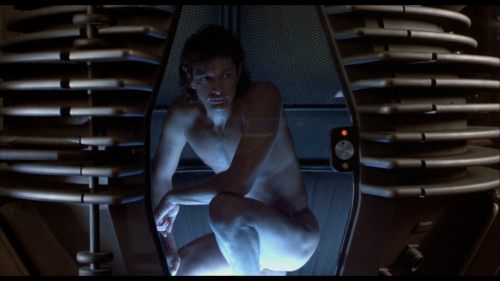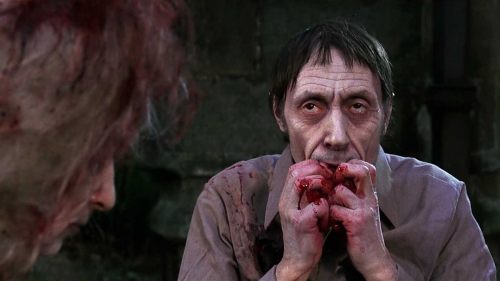Beyond Fest: David Cronenberg’s VIDEODROME Is The Diary Of A Cult Film Collector
By 1983, David Cronenberg had been operating in extremes for most of the last decade, having carved out a niche in the horror/exploitation film scene via his visceral, now trademarked "body horror". In fairness, Cronenberg's output earned a label the filmmaker has somewhat rejected over time, often stating that genre is nothing more than a "marketing tool". Yet it's tough not to analyze his work during this period through the hyper-specific lens of categorization, as the lo-fi Canadian auteur was seemingly drawn to the ways horror filmmaking allowed him to smuggle subversive material into what many critics and audience members at the time dismissed as mere pieces of trash pulp fiction.
This fascination with extremity arguably peaked in ‘82, immediately after Cronenberg landed his biggest hit to date: the head-exploding telepathic showdown, Scanners ('81). The first in Cronenberg's captivation with "secret wars" waged by clandestine agencies that walk amongst their clueless human counterparts, Scanners’ tale of corporate espionage and rogue psychic races struck a chord with audiences (who were enticed by AVCO Embassy's brilliantly tantalizing ad campaign) to the tune of $15 million at the US box office. Suddenly, the Cronenbergian touch was in high demand, as the writer/director began fielding phone calls about Return of the Jedi ('83) and was even sought out to helm Flashdance ('83), as he was apparently the studio head's number one choice.
None of these projects interested Cronenberg. After all, he was still the Canux shock maestro who'd just delivered sexual slugs in Shivers ('75), a technological vampire in Rabid ('77), and murderous snow-suited dwarves in The Brood ('79). Scanners was the artist’s most mainstream-minded work to date, complete with car chases, shotgun shoot outs, an adventurous handcrafted superhero tone (predating the eventual X-Men [’00] franchise), and his appropriately bombastic sophomore collaboration with composer Howard Shore. In short, it was an accessible tweak on a burgeoning aesthetic that allowed Cronenberg to cross over somewhat and earn further clout with producers Pierre David, Victor Solnicki, and Claude Héroux. Now, these men wanted another film from their new cash cow, who subsequently leaned into his eccentric fetishes for their third creative partnership.
On paper, Videodrome was already Cronenberg's most surreal, extreme movie; a fact that remained even with the end product. In the earliest drafts, sleazy Channel 83 honcho Max Renn (James Woods) tries to stave off the overwhelming hallucinatory state he finds himself in after viewing the titular showcase of torture and murder. Gripped by mania, Renn chops off his new flesh gun hand at the wrist, which then grows back as a lumpy grenade (an effect that was re-purposed onto one of his enemies in the final film). During a love scene with masochistic self-help host Nicki Brand (Blondie frontwoman Debbie Harry), Max's face melts and congeals into his lover’s to form a new organism, which crawls up a stranger's leg. Instead of corporate conspirator Barry Conex (Les Carlson) exploding into a mass of deadly tumors, five others experience the same grisly fate.
Much to his surprise, the producers loved the script, and it helped attract both Woods and Harry to work with Cronenberg. However, Videodrome was re-written and toned down somewhat, with the writer/director pounding away and re-working scenes right up until the last day of production. Perhaps the unfinished nature of the screenplay helps explain why its plot – regarding Renn's quest to track down the origins of the eponymous pirated show (Pittsburgh?) – kind of meanders and zig-zags, all in a compact 89 minutes. Regardless, there's never a lack of urgency or Bunuelian headiness in how the narrative unfolds, complete with cancer guns and sparkly dancers shaking their stuff before the unveiling of Spectacular Optical's newest eyewear line. Cronenberg is wading through this hazy nightmare with us, trying not to get caught in the subterranean market crossfire.
It's difficult to take James Woods seriously in 2018. The former professional fictional greaseball somehow managed to become a real life racist uncle, so even when he's contextually terrific as a crooked prison guard in James B. Harris' Fast-Walking ('82), divorcing the now from the then is a moderately demanding proposition. Nevertheless, Max Renn might be Woods' greatest performative achievement, as Cronenberg's camera always seems to be attracted to the way he slithers through scenes. Woods carries Renn like a man who's seen it all and isn’t shocked by anything, amorally willing to let that callousness make him a buck along the way. The actor sells the Civic TV chief as a guy most comfortable in crummy hotel rooms, asking to see the last episode of whatever softcore Japanese muck Channel 83 would try to get away with broadcasting next. In fact, Woods is so brilliant in Videodrome that it makes his current day transformation into a right-wing mouthpiece that much more baffling. Facebook doth killed the sinewy court jester of disreputable cinema.
Renn's self-assured sleaziness is what also makes him a weirdly charismatic lead. Cronenberg's always maintained that he'd never write a protagonist who didn't have a sense of humor, because wit "conveys an understanding of the human condition". Renn is most certainly grinning through every clandestine rendezvous and piece of airy art porn, gleefully self-aware that he’s providing a service to society’s dregs. He knows that there will always be a market for more sex and even more violence, because that's what many inherently desire. Max may not even believe his own line of defense regarding how it's better that his audience get their kicks from his brand of entertainment instead of "out on the streets", but it sounds great on TV, and Nicki finds his brand of hucksterism amusing.
Like all customers of the weird and wicked, Renn also has limits, which he tests with each new piece of content he seeks out for "the one you take to bed with you". It's an impulse that anyone who’s spent any amount of time ingesting and collecting cult cinema can attest to being driven by. The cult movie collector acknowledges that the world is innately bizarre and cruel, and this tragic combination often yields some of the most radical, difficult to see works of outsider art. When combined with the film's now antiquated fixation on VHS tech (which was a fundamental, evolving format when Cronenberg’s movie was made), Videodrome becomes a fictional representation of even today's underground cinema fetishists, willing to go to the ends of the earth in order to discover the next gem of their collection.
In turn, Nicki tests Renn's limits of experience. Moving through similar underground channels combining sex and violence as Max, Harry transforms Brand into a similarly burned out dabbler in all things stimulating, even pain. When she says that she wants to become a contestant on Videodrome after Renn shows her the bootleg tape, it legitimately concerns him. Here is a woman who isn't just into the notion of watching torture and porn, but wants to engage in them on a physical level. Nicki slyly exposes Max's weakness; a man who uses the television screen to keep him at arm's length from actual atrocity. He's OK with profiting from pain, but is he fine with indulging his darkest desires in the same fashion his new lover does?
Carol Spier has always been something of an undervalued collaborator of Cronenberg's, as she acted as the art director and production designer on almost every film in his career. With Videodrome, the world Spier creates is harsh and remorseless, as Renn attempts to unravel the mystery of the "Videodrome signal" that his ace pirate Harlan (Peter Dvorsky – the film's secret MVP) has locked onto. We believe that the folks Max bumps elbows with could get their jollies off thanks to the raw torture and violence of his latest discovery, as cinematographer Mark Irwin captures wintry Toronto in deep blues, blacks and hard edges. Meanwhile, Shore's latest score (composed via computer, no less) layers a disorientingly seasick combination of ominous synths over this apocalyptic urban landscape, always keeping the audience just off-center. This is a vision of endurance, with social normality being the ultimate human trial.
"The television is the retina of the mind's eye." Cronenberg’s always attributed the oft confounding ethos of Videodrome to "medium is the message" scholar Marshall McLuhan (whom Jack Creley’s media prophet Brian O’Blivion is based upon). Videodrome acts as an extension of the auteur’s perverse attraction to the "technological man". Since the days of his underground films (such as Crimes of the Future ['70]), Cronenberg's explored the ways in which scientific advancements and the human form intermingle and become one, with skin grafts creating a techno Typhoid Mary (Rabid) and psychotherapy allowing a mother to literally give her rage a physical birth (The Brood). With Videodrome, Cronenberg seems to imply that our flesh is merely an impermanent home for individual existence, and that the invention of a New Flesh will allow a person to transcend through television. The collector becomes one with the content, allowing themselves to be transformed into the pure energy they've been chasing for a lifetime. Just load a new tape into Max’s vaginal torso opening and see what the next step in his journey toward self-destruction and rebirth will be.
Even a more literal reading of Videodrome marks it as a prescient work of pulp: predicting avatars standing in for people, television becoming "more than reality" (and "reality more than television"), plus a covert battle to control the message sent out over the airwaves (simultaneously causing those who enjoy a "scum show like Videodrome” to develop instant brain cancer). The fact that the most ominous figure in the whole film is a seemingly innocuous spec salesman named Barry Convex (regular Cronenberg player Les Carlson) speaks volumes about how the movie’s author views the counterculture, not to mention the mode of cinema he's operating within, as an essential component of the media landscape. We need more cerebrally inclined artists tackling the extremes of genre filmmaking, because straight-laced suits who see it as a threat may harbor more nefarious intentions for the general viewing public, should they not conform to their prudish whims. In this regard, “long live The New Flesh” isn’t so much the film's cryptic mantra as it is a rallying cry, sending believers in Cronenberg’s brand of entertaining fanaticism out of theaters and into the streets, searching for any and all smuttily packaged subversive material to add to their own archives; a contingency plan for when the airwaves are finally hijacked by these shady agents of orthodoxy.
Videodrome was presented via a gorgeous 35mm print at Beyond Fest. Nab your tickets for the final double feature (Crash ['96] & Spider ['02]) in their brilliant David Cronenberg retrospective here.



